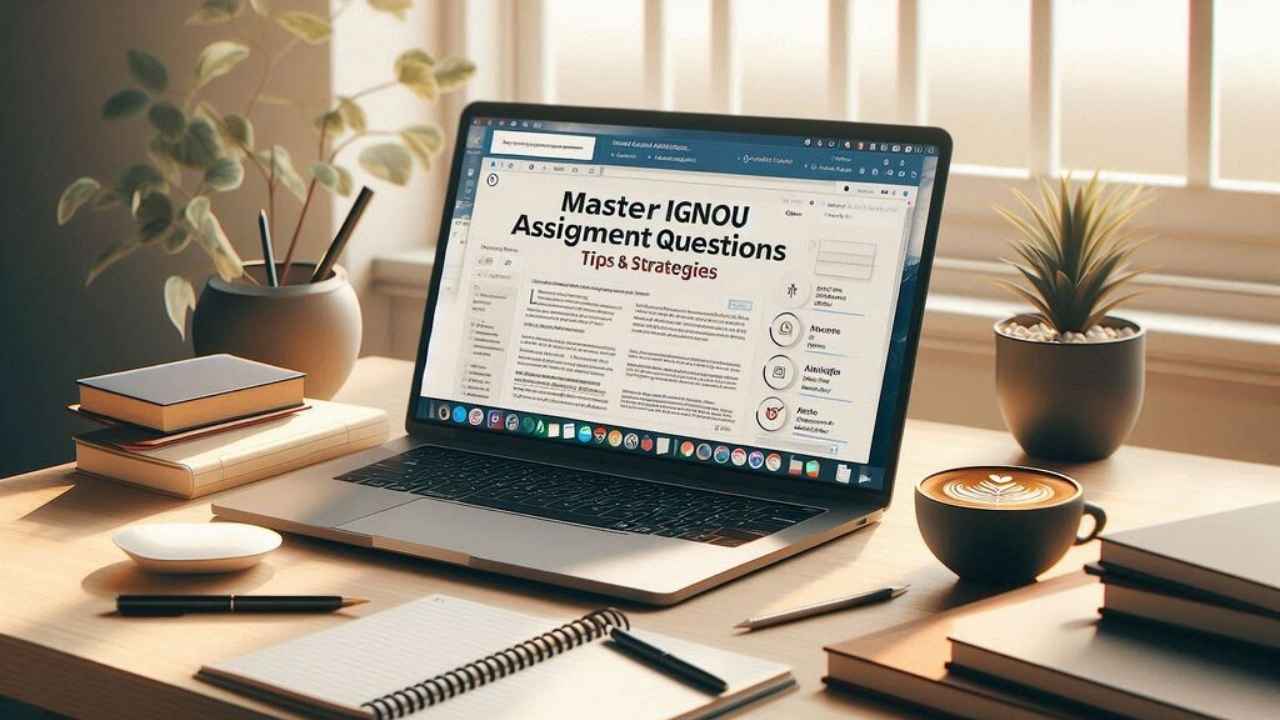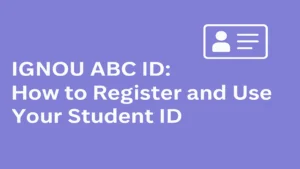Introduction
Overview of IGNOU Assignments
The Indira Gandhi National Open University (IGNOU) is one of the largest open universities in the world, offering flexible learning opportunities through various undergraduate, postgraduate, and diploma programs. Each program is designed to offer in-depth knowledge, and assignments play a pivotal role in assessing students’ understanding. Assignments at IGNOU are often project-based and provide an opportunity for students to showcase their grasp of the subject matter, applying theories learned to practical scenarios.
Why Solving Assignment Questions Effectively Matters
IGNOU assignments are an essential part of the evaluation process. They contribute significantly to your final grades, sometimes accounting for a large portion of your overall marks. Solving these assignments effectively ensures that you grasp the core concepts and can articulate them clearly and concisely, leading to better academic outcomes.
Purpose of This Guide
This article serves as a comprehensive guide on how to effectively tackle IGNOU assignment questions. By following the step-by-step strategies outlined here, students can improve their problem-solving techniques, enhance their writing quality, and ultimately achieve better grades in their assignments. Whether you’re struggling with time management or unsure about structuring your answers, this guide has you covered.
Understanding IGNOU Assignment Question Papers
Types of Questions in IGNOU Assignments
IGNOU assignments typically feature various types of questions, each requiring a different approach:
- Objective Questions: These could include multiple-choice questions (MCQs), true/false questions, and fill-in-the-blank questions. The goal is to assess your knowledge of the subject in a straightforward manner.
- Descriptive Questions: These questions require more detailed answers. They assess your ability to explain concepts, analyze situations, and provide evidence-based arguments.
- Application-based Questions: These are designed to test how well you can apply theoretical knowledge to real-world scenarios. They often require critical thinking and problem-solving skills.
Understanding the different types of questions will help you tailor your approach to each one and avoid making the common mistake of using the wrong method for a particular question.
How Questions Are Structured
IGNOU assignment questions are typically structured in a simple and logical manner. They often begin with a direct question, followed by sub-questions or instructions on how to answer. Pay close attention to the wording, as slight changes in phrasing can drastically alter what is being asked. For example, if a question asks you to “compare” two concepts, your answer should focus on both similarities and differences, not just one aspect.
Importance of Reading Instructions Carefully
The instructions in an assignment question paper are just as important as the questions themselves. Skipping over the instructions or misinterpreting them can lead to incorrect answers and lower marks. Always read the instructions carefully before starting any question to ensure you know what is being asked and how you should approach it.
Breaking Down Assignment Questions: A Smart Approach
Reading the Question Thoroughly
Before diving into the answer, take a moment to read the question carefully. This may seem obvious, but many students jump straight into writing without fully understanding the question. Take a few minutes to read and re-read the question to ensure you grasp its full meaning.
- Highlight Keywords: Identify important keywords like “discuss,” “analyze,” “compare,” “evaluate,” and “explain.” These will guide you on how to structure your answer.
- Understand the Scope: Understand the boundaries of the question. Are you required to provide a broad overview or focus on a specific aspect of the topic?
Identifying Key Elements in Questions
To effectively break down a question, start by identifying its key elements. If a question is multi-part, such as asking you to “Explain the theory of relativity and give real-world examples,” divide the question into two parts. This will ensure you address both components effectively.
- Core Topic: Identify the central concept of the question.
- Instructions: Understand what the question is asking you to do—be it explaining, analyzing, comparing, or evaluating.
- Keywords: Highlight action words (e.g., “discuss,” “critique,” “justify”) to determine the depth and scope of your response.
Breaking the Question into Subsections
If the question seems too complex, break it down further into smaller, manageable parts. For instance, if the question requires you to analyze the impact of climate change on agriculture, you could break it into smaller sections like causes, effects, and potential solutions. This makes it easier to tackle the question step by step.
Research and Preparation: The Key to Answering Effectively
Collecting Relevant Study Material
Once you’ve broken down the question, the next step is research. Use the course materials provided by IGNOU, such as textbooks, online resources, and lecture notes, to gather relevant information. IGNOU’s official study materials are often enough to craft a well-rounded answer, but it’s also beneficial to refer to external resources like academic journals or online educational platforms.
- Course Materials: IGNOU’s materials are tailored for the assignments and exams, making them highly relevant.
- Additional Resources: Utilize trusted external sources like Google Scholar or research papers to support your answers with up-to-date information.
Importance of Understanding the Course Material
It is crucial to have a deep understanding of the course material before attempting your assignments. Often, assignment questions require not only factual knowledge but also the ability to interpret and apply theories. Skim through your study materials and make sure you understand the core concepts of each module. Try summarizing key chapters in your own words to reinforce your understanding.
Making Use of Previous Assignments
One of the most effective ways to prepare for your assignments is to review previous papers. Look at how questions were phrased and what types of answers scored the highest marks. IGNOU often repeats question types, so getting familiar with past assignments can give you an edge.
Time Management for Solving Assignment Questions
How to Estimate Time per Question
Time management is one of the most important skills when it comes to solving IGNOU assignments effectively. It’s essential to allocate a certain amount of time for each question based on its complexity. For instance, multiple-choice questions should take less time than long descriptive answers.
- Set Time Limits: For a 10-mark question, aim to spend no more than 20-25 minutes. For a 20-mark question, allocate about 40-45 minutes.
- Prioritize Questions: If you’re unsure about a particular question, it’s okay to leave it for later. Start with the questions you feel most confident about.
Avoiding Time Wastage
To avoid wasting time, it’s important to stay focused. Don’t get bogged down by minor details or start second-guessing yourself halfway through an answer. Stay on track and refer to your notes only when necessary.
Creating a Time Management Plan for Each Assignment
Before starting any assignment, create a schedule outlining how long you plan to spend on each question. For example:
- 30 Minutes for research and reading the question
- 2 Hours for writing and structuring answers
- 30 Minutes for proofreading and finalizing
Structuring Your Answers
Importance of a Clear Introduction and Conclusion
A strong introduction and conclusion are essential components of any assignment answer. The introduction sets the tone and provides context, while the conclusion ties everything together, reiterating the main points of your answer.
- Introduction: Briefly introduce the topic, providing an overview of what you’ll discuss in the answer.
- Conclusion: Summarize your key findings or arguments, and offer a brief reflection or suggestion if applicable.
Body of the Answer: Logical Flow
The body of your answer should follow a logical structure that progresses naturally from one point to the next. Use paragraphs to organize different ideas or aspects of the question. Each paragraph should start with a clear topic sentence and include supporting evidence or explanations.
- Topic Sentences: Each paragraph should begin with a topic sentence that introduces the point you’re making.
- Logical Flow: Ensure that each point flows into the next, making your answer cohesive and easy to follow.
Using Bullet Points and Subheadings
Bullet points are useful for breaking up long paragraphs and making your answer more readable. They’re especially useful for lists or when providing examples. However, be sure to use them sparingly and only when necessary to avoid cluttering your answer.
- Subheadings: If your answer is lengthy, use subheadings to break it up into digestible sections.
- Bullet Points: Use them for clarity when listing multiple items or steps.
Answering Objective Questions in IGNOU Assignments
Understanding the Nature of Objective Questions
Objective questions, like multiple-choice questions (MCQs), true/false, and fill-in-the-blank questions, are designed to test your basic understanding of the subject. Although these questions seem straightforward, they require precision in both comprehension and application of knowledge.
- MCQs: These questions may seem simple, but they are often tricky. Read each option carefully before selecting your answer, and always double-check for the most appropriate choice.
- True/False Questions: Ensure that you understand the statement clearly. For “True” or “False” questions, the smallest change in phrasing can affect the meaning.
- Fill-in-the-Blanks: These require you to recall specific facts or terms. A lack of proper revision or understanding can lead to errors in these questions.
How to Tackle Multiple-Choice Questions (MCQs)
MCQs are often tricky, but there are strategies to improve your chances of answering them correctly:
- Read All Options: Don’t rush into picking the first answer you feel is correct. Read all options carefully to avoid falling into the trap of looking for only one right answer.
- Eliminate Incorrect Options: If you’re unsure, start by eliminating the most obviously incorrect options. This increases your chances of choosing the correct answer by process of elimination.
- Don’t Overthink: Trust your first instincts. Overthinking MCQs can often lead to incorrect answers, especially if you start second-guessing yourself.
True/False and Other Objective Questions
- True/False: Check for subtle differences in the wording of each option. For example, statements like “always” or “never” are usually red flags in true/false questions, as they may be too absolute.
- Fill-in-the-Blank: These questions typically test your knowledge of key terms or formulas. Practice recalling important concepts regularly to improve accuracy in answering these questions.
Answering Descriptive Questions in IGNOU Assignments
Crafting a Structured Response for Descriptive Questions
Descriptive questions require detailed and well-organized answers. These questions test your ability to elaborate on a topic, explain concepts, and support your arguments with examples.
- Introduction: Start with a brief introduction that gives an overview of the topic and the direction your answer will take.
- Body: The body of your answer should delve into the key points, explaining each in detail. Use examples wherever possible to support your argument or explanation.
- Conclusion: Conclude with a concise summary of your main points, offering your final opinion or insights if the question demands it.
Expanding on Key Concepts
For detailed questions, you’ll need to elaborate on each key concept. The goal is not just to define the terms but to show how they relate to the broader context of the subject. Explain theories in your own words, and where applicable, relate them to real-world scenarios.
- Use Real-World Examples: These will add depth to your answer and demonstrate a practical understanding of the theory.
- Avoid Generic Answers: Always steer clear of vague or generic responses. Specificity in your answers will not only impress your evaluator but also ensure that you address the question thoroughly.
Writing a Concise yet Informative Answer
While it’s important to elaborate on concepts, avoid writing unnecessary information that doesn’t add value to your answer. Focus on answering what is being asked, using clear and concise language. Keep your answers structured, and don’t deviate from the main topic.
Common Mistakes to Avoid While Solving IGNOU Assignment Questions
Not Following the Instructions
One of the most common mistakes students make is not following the assignment instructions properly. This can result in losing valuable marks. Pay attention to the word limit, formatting guidelines, and question-specific instructions.
- Word Limit: Exceeding the word limit can be as problematic as not reaching it. Stick to the prescribed length to avoid unnecessary deductions.
- Formatting: IGNOU assignments typically have strict formatting guidelines. Ensure you follow them, including font size, margins, and spacing.
Rushing Through the Answer
Many students rush through their assignment without taking enough time to formulate a well-thought-out response. This can result in incomplete answers, lack of clarity, or incorrect information.
- Take Your Time: Read each question thoroughly, plan your answer, and only then begin writing.
- Avoid Over-Editing: While it’s crucial to proofread, don’t waste too much time on editing in the middle of your writing process. Get your thoughts on paper first, then go back to polish them.
Misinterpreting Questions
Misunderstanding the assignment question is another frequent mistake. This can happen if you don’t read the question carefully or if you misunderstand key terms.
- Revisit Ambiguous Questions: If a question is unclear, take a few extra minutes to analyze it. Break it down into smaller parts to make sure you are answering correctly.
Not Proofreading Your Answers
Proofreading is crucial to avoid spelling, grammatical, and factual errors that could diminish the quality of your answers. Always allocate some time to read through your answers after you’ve completed them.
Revising and Finalizing Your IGNOU Assignment Answers
The Importance of Revising Your Answers
Revising your answers before submission is key to ensuring they are polished and error-free. Sometimes, during the writing process, small mistakes can slip through the cracks, and revision gives you the chance to fix them.
- Look for Logical Flow: Ensure that your ideas are logically connected, and there are no abrupt shifts between paragraphs.
- Check for Consistency: Make sure that your terminology and writing style are consistent throughout the assignment.
Proofreading for Grammar and Language
After revising your content, proofread your assignment to check for spelling mistakes, grammatical errors, or awkward phrasing. It’s easy to overlook minor errors when you’re deep into the writing process, so take a break before proofreading to approach it with a fresh perspective.
- Use Tools: You can use grammar-checking tools like Grammarly or the built-in spelling and grammar check in word processors, but don’t rely solely on them.
- Read Aloud: Reading your assignment out loud can help you catch mistakes that you might miss when reading silently.
Checking for Plagiarism
Plagiarism is a serious academic offense and can lead to disqualification from your course or program. Before submitting your assignment, run it through plagiarism detection tools to ensure the originality of your work.
- Cite Your Sources: If you reference any external materials, ensure that they are cited correctly in the format required by IGNOU.
- Avoid Copy-Pasting: Don’t directly copy content from books or the internet. Paraphrase and express ideas in your own words.
Submission Guidelines for IGNOU Assignments
Formatting and Documentation Requirements
Each IGNOU assignment must be submitted following specific formatting guidelines. These may include:
- Cover Page: Ensure that your assignment has the proper cover page, including your name, enrollment number, course code, assignment title, and submission date.
- Page Numbering: Don’t forget to include page numbers on your assignment.
- Font and Spacing: Usually, assignments are required to be written in a 12-point font size (Times New Roman) and 1.5 line spacing.
Submitting Online vs. Offline
Depending on your course and the instructions from IGNOU, assignments can either be submitted online or offline:
- Online Submission: Some assignments require you to upload them to the IGNOU portal. Make sure your file is in the correct format (usually PDF).
- Offline Submission: If your course requires offline submission, you will need to send the hard copy of your assignment to the designated IGNOU study center or regional center.
Meeting Deadlines
Meeting the submission deadline is crucial. Late submissions often lead to penalties or a complete rejection of your assignment. Set a personal deadline before the official one, allowing you time to review and make any last-minute changes.
Tips for Excelling in IGNOU Assignments
Consistent Study and Preparation
A key to doing well in IGNOU assignments is to maintain a consistent study schedule. By regularly reviewing your course materials, you can easily grasp important concepts that will be crucial for answering questions. Here’s how you can integrate consistent study habits into your daily routine:
- Daily Revision: Dedicate at least 1 hour daily to go through your notes or the syllabus. This habit will ensure you understand the content well before attempting the assignment.
- Create a Timetable: Break down the chapters in manageable chunks. This allows you to keep track of the topics you’ve studied, ensuring nothing is left behind.
Engage with Study Groups or Online Forums
Being part of a study group or engaging in online academic forums can significantly boost your understanding of tricky concepts. By discussing with peers, you not only get clarification on doubts but also get new perspectives on how to approach assignments. Here’s why you should consider this:
- Exchange Ideas: Study groups provide a space to discuss different approaches to solving questions. You can learn new techniques and gain insights that might improve your answers.
- Accountability: Being part of a group can also help keep you accountable for deadlines. Having regular meetups or check-ins ensures you’re on track with your studies.
Take Advantage of IGNOU’s Resources
IGNOU provides various resources like study materials, reference books, and question papers that can help you in preparing for assignments. Don’t hesitate to make the most of these resources:
- IGNOU Study Material: These are the primary resources. Read them thoroughly to understand key concepts and theories.
- Previous Year’s Question Papers: Going through past assignments and questions will help you understand the format and commonly asked questions. They also give you a sense of the level of difficulty.
How to Manage Stress While Solving IGNOU Assignments
Understanding Assignment Pressure
Assignments can sometimes feel overwhelming, especially with tight deadlines or when you’re handling multiple subjects. It’s essential to manage stress effectively to maintain focus and productivity. Here’s how you can keep stress at bay:
- Take Short Breaks: Working nonstop can lead to burnout. Take short 5-10 minute breaks after every 45 minutes of study. This will help you stay fresh and focused.
- Practice Deep Breathing: Stress can impact your ability to think clearly. Practice deep breathing exercises to relax and clear your mind.
Managing Time During High-Pressure Situations
During the final weeks before submission, time management becomes even more critical. Here are a few time-management techniques to reduce stress:
- Time Blocking: Block specific hours of the day for studying and completing assignments. This keeps you organized and helps you avoid last-minute cramming.
- Prioritize Tasks: Focus on completing high-priority or difficult assignments first, so you have enough time for the rest.
The Role of Feedback in Improving Your IGNOU Assignment Writing Skills
How to Use Feedback to Improve
Once you submit your assignments, feedback from your evaluator is valuable. It’s an opportunity to learn where you went wrong and how you can improve for future assignments. Here’s how you can use feedback effectively:
- Analyze Feedback Carefully: Pay close attention to areas marked as incorrect. This helps you understand where you need to focus more during your revision.
- Apply Feedback to Future Assignments: If your evaluator has pointed out specific mistakes, such as vague explanations or lack of references, make sure to correct those in subsequent assignments.
Seeking Clarifications on Feedback
If you don’t understand the feedback or need more clarity, don’t hesitate to ask your evaluator. IGNOU allows students to reach out to professors or tutors for further explanations, which can help you improve your writing.
Conclusion
Successfully tackling your IGNOU assignments requires a combination of diligent preparation, time management, understanding the types of questions, and consistent practice. By following the tips shared in this article, you’ll be well on your way to completing your assignments efficiently and effectively.
Remember, the assignments are not just a means of evaluation—they’re an integral part of your learning journey. By approaching them methodically and thoughtfully, you will gain a deeper understanding of your course material, which will help you excel academically.
With practice, perseverance, and the right strategies, you can ace your IGNOU assignments and set yourself up for success in your program.
So, take the first step today—organize your study time, get into a productive routine, and begin working through those assignments with confidence. Good luck!
Frequently Asked Questions (FAQs)
How should I manage my time effectively while working on multiple assignments?
Prioritize assignments based on their due dates and marks. Set aside specific time blocks each day for focused work on each assignment. Utilize time management techniques like the Pomodoro Technique to maintain productivity.
Can I reuse my previous assignments for current ones?
While you can refer to previous work for reference, copying from old assignments is not advised as each assignment should reflect your understanding of the current syllabus. Always aim to provide fresh, relevant answers.
Is it important to write everything in my own words in the assignment?
Yes! Rewriting information in your own words demonstrates your understanding of the concepts and reduces the risk of plagiarism. Be sure to paraphrase and use citations where necessary.
What should I do if I don’t understand a question in the assignment?
If you don’t understand a question, break it down into smaller components. Research online, ask peers, or consult your course instructor. Once you gain clarity, approach the question methodically.
Can I submit my IGNOU assignments after the deadline?
It’s advisable to submit assignments on time. Late submissions may be accepted under exceptional circumstances, but it can affect your grade or lead to penalties. Always try to submit ahead of the deadline to avoid any complications.
Related Posts:
- Create a Proper IGNOU Assignment Front Page 2025: Step-to-Step Guide
- How to Download IGNOU Results Online 2025: A Comprehensive Process
- Change IGNOU Login Password 2025: A Comprehensive Step-by-Step Guide
- How to Access IGNOU Student Login Portal 2025: A Detailed & Comprehensive Guide
- IGNOU Admission Dates Extended for January 2025 Session: Everything You Need to Know




